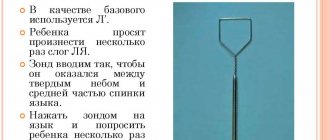Burr is a defect in the pronunciation of the letter “r”, resulting from a violation of the articulation of the speech apparatus. It sounds soft, there is a similarity with other sounds. Deviation rarely causes significant discomfort in people. The degree of its severity depends on the cause of its occurrence. They turn to a speech therapist to eliminate a speech defect, and if they want to “acquire” this skill, they practice it at home.
French is considered one of the most beautiful languages in the world and is loved by many. This is due to its phonetics. The special pronunciation of the letter “r” is called “grassing,” which translated means “burr.” By the way, if a Frenchman pronounces this sound clearly, he is considered uneducated. This is approximately how we treat “GC”. From a linguistic point of view, there is a distinction between Latin and French “R”, represented by different letters of the same meaning.
Mythical and real reasons
In former times, there were many myths about the causes of Jewish burr. There is a legend that the prophet Moses was distinguished by this peculiarity of speech. The Jews considered themselves descendants of this biblical character. They believed that burring was passed down to them from their great ancestor.
According to another legend, this speech trait was given to the Jews by God. It was a kind of gift to the Israelis. Therefore, representatives of the Jewish nation were not only not embarrassed by burr, but were even proud of such speech.
Of course, such explanations have nothing to do with reality. The reasons for burring lie in the peculiarities of the language.
When we start learning foreign languages, sometimes it is difficult for us to pronounce individual sounds. These vowels and consonants simply do not exist in our native speech. And we sometimes replace them with familiar sounds from the Russian language. This is exactly the case with the burrs of the Jews and the French. After all, pronunciation is the most difficult part of mastering foreign languages.
Double consonants
Double consonants are read as one sound, for example: A nn e [an] - Anna, ba tt e [bat] - sledgehammer.
Exercise No. 7. Read:
| date [dat] — date | patte [pat] - paw |
| datte [dat] - date | panne [pan] - accident |
| nappe [nap] - tablecloth | fade [fad] - insipid, -aya, -oe |
| natte [nat] - braid (braided hair) | bave [ba:v] - saliva |
Hebrew and Yiddish
Hebrew is spoken primarily by Israeli Jews. However, this language is widespread in Jewish communities and diasporas around the world. Its characteristic feature is the guttural pronunciation of the letter “r”. This is what we perceive as burr.
A wide forehead is not a problem: a selection of fashionable haircuts that will hide it
What changes in the body will regular consumption of tuna lead to?
If it’s a dress, then with a print: how to wear trendy basic items in spring 2022
Among the Jews of Europe and Russia, the Yiddish language is widespread. It sounds like German speech. In Germanic languages, the sound "r" is not pronounced clearly. Therefore, Jews who have spoken Yiddish since childhood can also lisp.
Exercises for those who want to burr
There are still ways to learn to burr. These include special exercises. They can also be found in the French language program. There are a lot of exercises that allow you to acquire the skill of grazing the letter “P”. It is worth highlighting some of them:
- It is necessary to stand in front of a mirror, because it is much easier to do the exercises when you can control the work of your speech organ. Next, you will need to press the middle of the tongue to the palate, and apply the tip to the lower jaw. In this position of the organs, try to reproduce the sound “R”.
- Now you need to again touch the palate and pharynx with the base of the speech organ, while straining it strongly. Try to pronounce the letter again.
- This exercise requires a glass of water. You need to gargle while pronouncing the sound “R”. After this, you should try to do the same thing, only without the help of water. The sound should be vibrating.
All these exercises must be done regularly. You need to understand that nothing will work out the first time. If you are diligent, then soon all these activities will not cause any difficulties and your goal will be achieved.
Language environment
Surely you have met many Jews who have no problems pronouncing the sounds of Russian speech. Not all representatives of this people burr. What does this depend on?
Let's go a little deeper into history. In earlier times, Jews lived in communities in specific regions called “shtetls.” Many people spoke Russian, but mostly spoke Hebrew or Yiddish.
Jewish children grew up in an isolated linguistic environment. From a very young age, they heard their parents speak Hebrew or Yiddish. At the same time, the children were taught to speak Russian. But at the same time, the child adopted the guttural pronunciation “r” from adults.
If a Jew begins to learn Russian as an adult, then no problems with pronouncing sounds arise. Sooner or later a person masters correct and clear articulation. Burr is characteristic of those people who, from early childhood, heard Russian speech with a Jewish accent.
What color raisins do you choose? Each has its own properties and benefits
Hieromonk Macarius told how to fast correctly and without harm to health
The water will go to the roots. Lifehack with a bottle for proper watering of seedlings
Nowadays it is very difficult to meet a burring Jew. In Russia, these people are quite assimilated. Most Jews speak Russian from early childhood and often do not even speak their native languages. These people do not have any problems pronouncing sounds.
Learn to burr by imitating
First of all, start by studying the peculiarities of the mechanisms of pronunciation of the standard “R” sound. After all, in order to learn the defective “r” you need to clearly understand the mechanisms of its action. Next, study the features of the pronunciation of the engraved “R”. Having studied the differences, you will find that when pronouncing the standard “R”, the tip of the tongue is actively used. The grazing “P” engages the root of the tongue, its base.
Feel where your tongue is located when pronouncing this sound. As soon as you feel this, smoothly move your tongue from tip to root. If you fail, try pronouncing the “G” sound in the Ukrainian manner; this practice will help relieve excess tension from the tongue.
Learn what a slashed "R" sounds like
An important condition when learning to engrave “R” is your consciousness and understanding of how this sound is correctly reproduced.
Download French songs to your player, watch movies, TV series and programs with subtitles and pay attention to how “R” is pronounced in this language. Carefully repeat the words after the French, make sure that the pronunciation is perfect or at least similar.
To monitor your acquired skills, record your voice by reading a couple of sentences in French and listen critically.
French burr
The French language is characterized by a guttural and “growling” pronunciation of “r”. Linguists call this sound “grassing.” It is grazing that we perceive as burring.
There are many versions of the origin of the French burr. However, experts believe that the fuzzy “r” sound was borrowed from the English language. In ancient times, the British conquered the northern regions of France. The pronunciation of the British also affected the peculiarities of French speech.
If a Frenchman pronounces the “r” clearly, it is considered incorrect. This speech is typical for rural residents who speak local dialects.
Because of this feature, French is considered quite difficult to master. Not everyone is able to grade correctly.
Types of grassage
According to the characteristics of phoneme formation, three types of “r” are distinguished:
- apical, or front-lingual - its pronunciation is based on the participation of the tip of the tongue;
- dorsal (back-lingual), respectively, formed using the back of the back of the tongue or the edge of the soft palate; there is no vibration when it is fed;
- “grassed”, formed due to the vibration of a small tongue.
In modern French, the dorsal, or Parisian, variant is more often heard. Its difference from the usual “r” is that not only the tip of the tongue is involved in its formation.
How to check this: say a familiar sound and remember the location of the organ at that time. Then try to engage the base of the tongue in the process. Burr will appear after the air flow passes through the throat and oral cavity. It is now fashionable to burr in French among adults and young people. In childhood, on the contrary, they try to get rid of this deviation.
When pronouncing “g” in the Ukrainian manner, if the number of hesitations is more than one, you will get the German pronunciation “r”.
How to learn to pronounce "r"
Often, burring disturbs a person. This feature of speech can create difficulties for those people who have to communicate with clients or give public speeches. The following exercises will help you overcome this speech therapy defect:
- Move your tongue left and right along the inside of your upper teeth. Your movements should resemble brushing your teeth.
- Open your mouth wide and stroke your upper teeth and palate with your tongue. Make up and down movements.
- Open your mouth and hold your lower jaw with your hands. Lick your upper lip with your tongue. Don't help yourself with your jaw!
After articulation exercises, move on to speech classes. Say short words with problematic sounds. When it sounds clear enough to you, you can move on to tongue twisters, in which “r” is often repeated.
How does the sound “X” help?
The mechanism of formation of these two phonemes is similar. Exercise for setting a graded “r”:
- Say the word with the letter “X” several times (bread, halva). Pay attention to the movements of the tongue at this time.
- Next, play the sound separately, gradually trying to replace it with a sonorous one.
- As the workout ends, you should hear a defective "P".
It will not be possible to quickly achieve lasting results; the main thing is not to interrupt classes and carry them out daily. After your sound becomes burry, it must be fully introduced into speech. If you do not use this skill systematically, it is easy to lose it. In this case, you will have to start lessons over again. The maximum result is such that a person can easily rearrange the articulation of sound at any time without much effort.
“Alors là” / “So what’s there...”
But the next “composition” is again shown with your hands and will make it clear that your companion does not care at all how the circumstances turn out. If you are discussing a decision, then in this case he shows that he doesn’t care. To do this, he will raise two arms, bending his elbows and turning them with his palms facing you (somewhat reminiscent of the “surrender” gesture).
In addition to indifference, this can also convey ignorance, disagreement, doubt, or non-involvement in the issue at hand.
"Faire la moue" / "Pouty Lips"
And one more “duck”, which, alas, again does not mean anything good (and really, why did you annoy your interlocutor so much? ) Now, however, the hands are no longer involved, and the signal will be the lips extended “in a tube”. By the way, this is a typically French gesture; all other nations most likely borrowed it from some of their Parisian acquaintances.
Let's start learning: how to pronounce “R” in French!
"How is your throat?"
Wait...what does this have to do with the French language?
This is not a typical question that is asked unless someone has a cold. But when it comes to learning French, you may suddenly find yourself with a sore throat.
"Why?" - you ask.
Well, the French language is known for having some sounds that are difficult to pronounce.
These include sounds that are actually pronounced through the nose and other vowel sounds (unique to French), such as the u sound found in cru.
But what sound in particular causes a peculiar scratching sensation in your throat?
Of course it's the French "R" sound!
This is perhaps the most difficult pronunciation method for French learners.
This sound is unique to French—it differs from the English rhotic "R" and trill "R" (also known as the "rolled R") found in other European languages such as Spanish, Italian and Russian.
In addition to a good French pronunciation guide, the best way to master the French "R" sound is to go to France and practice there. But before you book a trip to France, let me share some fantastic news - the best place to find French pronunciation tools is the Internet!
Use Forvo to hear the pronunciation of any French word
The key to sounding the French letter "R" correctly is hearing it clearly and having an authentic sound recorded by native speakers.
For this, I recommend the Forvo Audio Dictionary. Simply search for a French word containing the letter "R" to hear its pronunciation. This is especially useful when you're trying to hear how to pronounce the letter "R" in French in combination with other consonants, such as in the word Crime.
Practice with online exercises from Simple-French.com
Exercises to practice the French letter “R” are also required! Simple-French.com offers quite a few audio recordings as well as exercises you can practice on your own.
The exercises involve saying several different sounds and words using the letter "R". Gradually you get closer and closer to being able to pronounce it more accurately. To test your pronunciation, each exercise also includes audio.
If you're serious about improving your French pronunciation, make it a goal to practice once a day until it becomes second nature. Even if you get it right the first time, repetition is what will help you really get the hang of it.
Watch a YouTube video about the letter "R" in French
YouTube is also a great way to practice the "R" sound in French. Language City offers a short video explanation of the sound along with practice exercises, and the University of Michigan includes a video on the "R" sound in its series on French pronunciation.
Have a glass of water ready! All those French "R" exercises can make your throat dry out.
You can get rid of the defect yourself
In an attempt to save money, many try to solve the problem on their own - now there are many textbooks and materials on the Internet. People mistakenly think that they can eliminate burr if they simply repeat after the announcers on television - it seems that then the speech apparatus will automatically adjust to correct speech.
You can repeat it if you understand how to do it correctly. And if you don’t know how articulatory mechanisms work, listening to the news will be of no use. Often adults who try to correct burr on their own do not understand why they are unable to do so. They feel like they need to speak louder, more exaggeratedly, but this can simply enhance the effect of incorrect pronunciation.
Experts do not hide: articulation exercises are indeed quite simple in most cases, and they can be found in the public domain. But each person with a speech impediment has his own nuances, and only a professional can evaluate them.
It is better not to engage in amateur performances, because even people without a burr who want to develop their diction will achieve little by repeating after newscasters. It’s not for nothing that actors learn special tongue twisters and proverbs.
"Mon œil" / "My Eyes"
French gestures can be really funny, especially if you don't know their meaning. How, for example, can you understand what is meant if a friend... pulls back his lower eyelid? Maybe there was a speck in his eye?
Not at all! Most likely, your friend is demonstrating to you that he does not believe what he heard at all, or even that it is an absolute lie.
Discreet Method
If the approach and "K" methods don't work, there is still hope!
However, be careful: this method is a bit rough!
You may have unknowingly pronounced the French letter “R” several times in your life.
Usually, when you have a cold, you need to clear the back of your throat of mucus. We often do this by churning up the mucus (inhaling it from the back of the throat) and then spitting it out.
No matter how disgusting it may sound, it is in this horking that the French “R” sound is born.
But wait! No need to spit everywhere!
Aim for a softer sound than the hork.
You should try to achieve a more consistent vibration rather than a harsh crack.
If this is too rough for you, you can use snoring as the basis for the sound.










